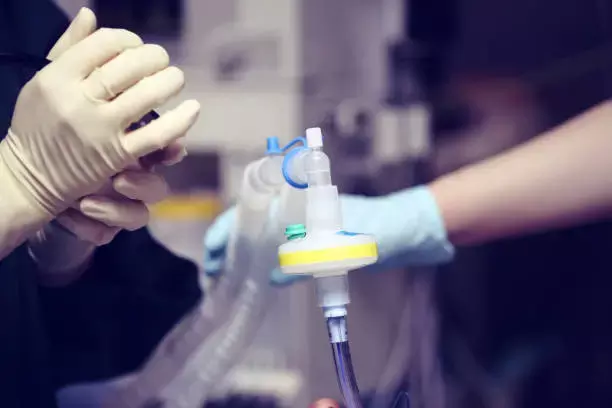- Home
- Medical news & Guidelines
- Anesthesiology
- Cardiology and CTVS
- Critical Care
- Dentistry
- Dermatology
- Diabetes and Endocrinology
- ENT
- Gastroenterology
- Medicine
- Nephrology
- Neurology
- Obstretics-Gynaecology
- Oncology
- Ophthalmology
- Orthopaedics
- Pediatrics-Neonatology
- Psychiatry
- Pulmonology
- Radiology
- Surgery
- Urology
- Laboratory Medicine
- Diet
- Nursing
- Paramedical
- Physiotherapy
- Health news
- Fact Check
- Bone Health Fact Check
- Brain Health Fact Check
- Cancer Related Fact Check
- Child Care Fact Check
- Dental and oral health fact check
- Diabetes and metabolic health fact check
- Diet and Nutrition Fact Check
- Eye and ENT Care Fact Check
- Fitness fact check
- Gut health fact check
- Heart health fact check
- Kidney health fact check
- Medical education fact check
- Men's health fact check
- Respiratory fact check
- Skin and hair care fact check
- Vaccine and Immunization fact check
- Women's health fact check
- AYUSH
- State News
- Andaman and Nicobar Islands
- Andhra Pradesh
- Arunachal Pradesh
- Assam
- Bihar
- Chandigarh
- Chattisgarh
- Dadra and Nagar Haveli
- Daman and Diu
- Delhi
- Goa
- Gujarat
- Haryana
- Himachal Pradesh
- Jammu & Kashmir
- Jharkhand
- Karnataka
- Kerala
- Ladakh
- Lakshadweep
- Madhya Pradesh
- Maharashtra
- Manipur
- Meghalaya
- Mizoram
- Nagaland
- Odisha
- Puducherry
- Punjab
- Rajasthan
- Sikkim
- Tamil Nadu
- Telangana
- Tripura
- Uttar Pradesh
- Uttrakhand
- West Bengal
- Medical Education
- Industry
Chest CT score predicts response of COVID-19 pneumonia patients to ventilation: Study

Italy: A recent study published in the Journal of Cardiothoracic and Vascular Anesthesia, has reported the effective use of non-invasive positive pressure ventilation (NPPV) in COVID-19 pneumonia patients. Luca Arcari, Covid-Cardiology Unit, Madre Giuseppina Vannini Hospital, Rome, Italy, and colleagues found that a semi-quantitative chest CT analysis at hospital admission may accurately identify people who respond poorly to NPPV.
Coronavirus disease-19 (COVID-19) is a respiratory tract infection having a significant rate of respiratory insufficiency, mortality, hospitalization need. NPPV is an emerging efficient tool for the treatment of Coronavirus disease-19 (COVID-19) pneumonia. However, the factors that influence the failure of NPPV are still elusive. Arcari and the team aimed to investigate the relationships between semiquantitative chest computed tomography (CT) scoring and NPPV failure and mortality in patients with COVID-19 in an observational study.
The study included 112 patients consecutively admitted for COVID-19 pneumonia. At hospital admission, the researchers calculated a semi-quantitative CT-score at hospital admission. Subgroups were identified according to the ventilation strategy used (oxygen delivered by Venturi mask n=53; NPPV-responder n=38; NPPV-failure n=21). The primary endpoint of the study was NPPV use. The secondary endpoints were NPPV failure and in-hospital death, respectively.
The study yielded the following findings:
- CT-score progressively increased among groups (6 vs 9 vs 14).
- CT-score was an independent predictor of all study endpoints (primary endpoint: 1.25; NPPV failure: 1.41; in-hospital mortality: 1.21).
- According to receiver operator characteristics curve analysis, CT-score was the most accurate variable for prediction of NPPV failure (area under the curve 0.862).
Arcari and colleagues concluded, "In our population, NPPV was an effective tool for the management of COVID-19 pneumonia-related respiratory insufficiency outside ICUs. Semi-quantitative chest CT analysis at hospital admission provided highly reproducible prognostic information, especially in terms of responsiveness to NPPV." However, researchers stress the need for further studies to fully assess if the routine implementation of CT score to guide clinical management might bring advantages in the care of COVID-19 pneumonia patients.
Reference:
The study titled, "Semi-quantitative chest-CT severity score predicts failure of non-invasive positive pressure ventilation in people hospitalized for COVID-19 pneumonia," is published in the Journal of Cardiothoracic and Vascular Anesthesia.
DOI: https://www.jcvaonline.com/article/S1053-0770(21)00823-5/fulltext
Dr Kamal Kant Kohli-MBBS, DTCD- a chest specialist with more than 30 years of practice and a flair for writing clinical articles, Dr Kamal Kant Kohli joined Medical Dialogues as a Chief Editor of Medical News. Besides writing articles, as an editor, he proofreads and verifies all the medical content published on Medical Dialogues including those coming from journals, studies,medical conferences,guidelines etc. Email: drkohli@medicaldialogues.in. Contact no. 011-43720751


